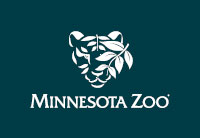After a long winter under ice and mud, Minnesota’s turtles emerge with the first warm rays of spring sun. It is also at this time that Minnesota Zoo Conservation staff gear up for the coming busy field season.

Minnesota Zoo Conservation Biologist Dr. Tricia Markle in the field with a wood turtle hatchling.
For Conservation Biologist Dr. Tricia Markle, this means frequent trips away from the Zoo to check on populations of threatened wood turtles in southern Minnesota. Now entering its 5th year, the Zoo’s wood turtle project is part of a collaborative initiative with the Minnesota Department of Natural Resources.
We are working to better understand these elusive turtles, as populations have been declining for decades. Using radio telemetry and GPS data loggers, Zoo staff can track turtles to better understand their habitat needs, identify threats, and find nesting sites.
While working on long-term solutions to address turtle needs, we can boost populations in the short-term through a process known as “head-starting.” In the wild, we estimate that more than 90% of wood turtle eggs are lost to predators like raccoons, skunks, and moles.
By rearing eggs and young turtles in human care during this most vulnerable period, we can help to ensure that young turtles continue to be added to the population each year.

Head-start turtle hatchlings spend their first year being reared at the Zoo before being reintroduced into the wild.
To find turtle eggs, we work with the DNR to track female turtles each June and then wait patiently into the night for the turtles to nest. Although some nests can be protected with predator-proof cages or electric fencing, other eggs remain in danger from agriculture equipment or river flooding. We bring a portion of the eggs back to the Zoo for incubation and then raise the young through their first year.
To date, the Zoo has released 18 head-start turtles, with another 20 individuals to be released this spring. Some of these turtles are even tracked with tiny transmitters so that we can learn more about the needs of juvenile turtles, helping to ensure success at all life stages.
Watch a short video of our turtle conservation work in action and check out ways that you can help turtles! A special thank you to Morrie’s Auto Group for providing the Zoo’s field research vehicle to support the Zoo’s conservation efforts.




Get Social